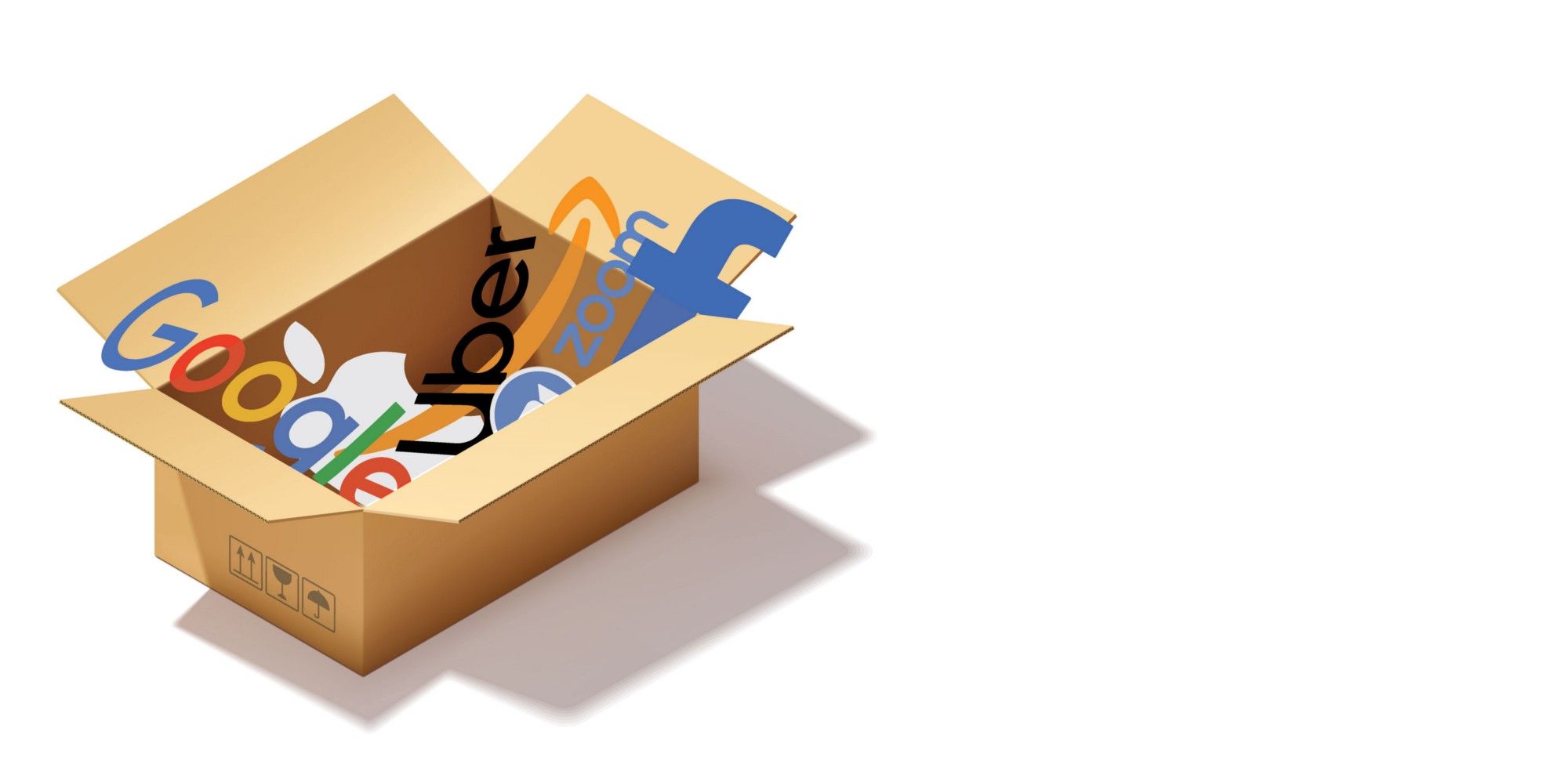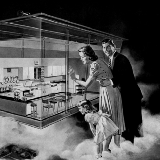Tech Companies Are Non-Essential Services
All the startups go in a box to the left

I write this on an Apple laptop, using Medium, checking Twitter. It’s nice, but all non-essential. Amazon, Zoom, Facebook, Uber— these are all non-essential services. They could all disappear and we’d quickly adapt. You’d get your goods from a local store. You’d make a phone call. You’d use the phone book. You’d call a cab.
By non-essential I mean two things. One, that these services are not required for public health and welfare. For life. Two, that these services are easily replaceable with older technology. Quality of life would go on.
Finally, by tech I mean, generally, consumer tech. The highest valued startups, getting the highest praise, the companies changing the world, etc. I’d argue that it’s mostly hype. During a time of pandemic, none of them have been deemed essential services. These tech giants have created wealth but not value. They are toys, not tools.
Standing on the shoulders of giants, these self-proclaimed titans have knit fancy epaulets and collected rent. You can strip it all away, down to basic telephony and the world would go on just fine. There’s nothing new under the NASDAQ.
Imagine, for example, that you just draw the line at basic 1990s Internet and everything else disappears. All the consumer tech companies, all the household names. It’d be annoying for a bit, but then we’d just pick up the phone. To quote Beyonce “Don’t you ever for a second get to thinking, you’re irreplaceable.”
Amazon
Is Amazon essential? By both definitions no. This is obvious because many countries don’t have Amazon (like mine) and we’re fine. They sell essential goods, but you can get those elsewhere. People have been ordering goods through catalogs since 1498.
Is Amazon fast, efficient, and very easy to use? Yes, it’s a delight. Is it essential? No.
The richest man in the world didn’t create anything new. He just sat on top of the Post Office and collected rent. He’s just a king of convenience. In inconvenient times, it really doesn’t matter.
Zoom
But how would we work without video conferencing? Well, have you been on a video call? Is it essential?
A lot of video calls don’t need to happen at all, and those that do don’t require video. Earnings calls are just calls, they’re important and they do fine. Conference calls have been around since 1956.
Yes, you’ll miss looking up your co-worker's nose, but business would go on just fine without Zoom.
But what about Google, you say. What about knowledge? Well, I lived many years before Google and we had knowledge then. Books, libraries, newspapers, picking up the phone.
There is something to be said about the near-instant exchange of scientific information, but we had that before Google and even the WWW. The Internet connected academic and scientific institutions in the 1960s. I remember using GopherNet to browse academic file systems in the 90s. A world where just that existed would be enough for COVID-19.
Google has made everything faster and better, but it didn't make everything. Everything existed before, and would go on without them just fine.
Food Delivery
But what about UberEats? What about grocery delivery? That’s an easy one. Just pick up the phone and call a restaurant. People have been doing that for years. They still do it. It works fine. Same for groceries.
Hell, in the not-so-distant old days, people used to come door-to-door with milk, vegetables, bread. Nowadays you’d call that a startup, get a billion-dollar valuation, and find a way to somehow lose money. During our curfew here, that system has re-emerged, and it works fine.
Yes, I can’t get exactly what I want when I want it, but that’s not essential. You could even say that this has been destructive. Always on delivery is inefficient, polluting, and not profitable. Much of the delivery business is a Ponzi scheme to pass on to the next investor. We can feed ourselves fine without it.
Facebook/Twitter/Instagram/etc
Many of the communication startups could be summarized as better, angrier telegraph. It’s not clear how much value we’d lose by writing letters to our local newspaper or getting our society photos from a magazine. These things are all nice to have and God knows they pass the time in quarantine, but people go without them now, all over the world. And the world goes on.
These communication startups are often bad for health and welfare, and they can easily be replaced by other forms of communication. So, to the left.
Virtual Medicine/Education/Services
I use telemedicine. Sometimes the video call gets janky and the doctor just gives us a regular phone call. It works fine. You don’t even need Internet for distance learning, my wife’s grandfather got correspondence courses through the mail.
Service can be made easier through modern technology, but you can still get the same service done through phone and mail. Which brings me back to my point.
Phone And Mail
Every modern tech product just sits on top of old phone and mail systems. The Internet was built on phone lines. It’s evolved dedicated networks, but we still use the same line for phone and data. Most people do. For almost any modern tech product you can replace it with ‘pick up the phone’.
- Uber — pick up the phone. Call a cab
- Alibaba — pick up the phone. You don’t even need a phone, people have been trading for thousands of years.
- GMail — real mail. Or pick up the phone if it’s urgent.
- Medium — Write to a publisher. Nail your writing to a wall. It worked for Martin Luther. His theses went viral from one door.
The Edges Of This
Of course, the biggest real tech companies (by revenue) are not the over-hyped consumer darlings, they’re hardware and backend technology like Apple, Samsung, Foxconn, Microsoft, Huawei, etc. Are these essential services?
I’d argue no. They run our modern tech stack, but not the root layer of phone and mail. So they too would be replaceable. People managed to crunch enough data to send people to the Moon. Work would go on.
Then take the iPhone, how can you live without a phone, camera, and computer all in one. Simple, just don’t have them in one, and don’t have it in your pocket, and maybe delay gratification a bit. Done.
You could also say that working from home is essential now, and that we need tools like Slack and Zoom to do it. While they certainly help, I still think they’re replaceable. As long as you can share files and have email, I think you could still get work done just fine. If you want to leave email out, just use the mail. Few things are actually that time-sensitive. The real, ground-breaking innovations are still in the past, not coming from modern tech companies.
Real Innovation Stopped In The 1960s
The fact is that real invention stopped in the 1960s, the 90s if you want to stretch it. Things have been refined, made more efficient, and capitalized since then, but nothing’s been made new.
Imagine the telegraph or the telephone, it just seems like magic. What we have now is magic in a bottle, but still the same magic. It’s just improvements on an old invention. Washing machines, dishwashers, airplanes, cars, communication technology — it’s all better, but nothing has been reinvented, as I’ve written about here:

Everything we call modern tech is just a layer of convenience on top of the functionality of the last century. You can take that layer off and the function remains. In 99% of cases, you can just pick up the phone, or use the mail.
Am I going to stop using modern conveniences? No, why? They’re convenient. I’m just saying that they’re not essential. I don’t need them to live, and everything they do is replaceable, with less convenience. Mark Zuckerberg is fundamentally less useful to society than a grocery clerk, or a farmer, or someone mopping a floor. We need to stop treating all of these people as gods, and these companies as manna from heaven. They’re non-essential services.